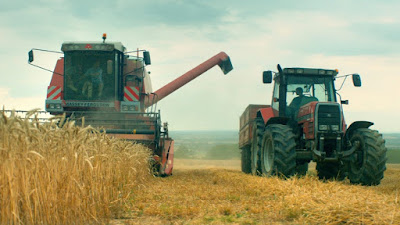Right, that was a fun four days. I'm going to run through the nine films I saw with some brief notes and a rating on each. Here goes.
My Rembrandt
Desert One
This documentary, by esteemed filmmaker Barbara Kopple, tells the story of the failed attempt to rescue American hostages from the U.S. embassy in Tehran after the Iranian revolution in 1979. There are some good moments here (notably interviews with U.S. President Jimmy Carter and his Vice-President, Walter Mondale) and the animation is pretty good. The issues I had are more to do with the way Kopple glorifies the cock-up and vilifies almost anyone not in a U.S. forces uniform. It also got fairly boring, which should have been easy to avoid with such a gripping real life tale.
iHuman
There's a lot to recommend in this doco about the future of AI. It starts with Jürgen Schmidhuber, an absolute bellend who is supposed to be the 'father of modern AI' and jumps about to other talking head geniuses expounding on the possibilities of where the world is heading. Some highlights (?) include the Chinese cities that use massive levels of surveillance and Project Maven, Google's hush-hush military connection. The visual effects are brilliant, as is the moment when a data analyst talks about managing our lives in the 'post-privacy age'.
The Trouble with Being Born
This is the film that was booed in Berlin and banned in Melbourne but I struggled to find why people would be so agitated by it. It's the story of an android built to replace a lost daughter, and the film leaves so much out that it's almost anti-exposition. It has some scenes that are slightly questionable (suggestive posing, erotic moaning) but these are handled in a sensitive, even otherworldly way. It's a film choc-filled with grief and loneliness, sewn together with mysterious time shifts and odd people and places. It's how I imagine Spielberg's AI would have turned out were it any good.
Atlantis
Well, this was a hard slog. Ukraine have won a war with Russia but things are still bleak, and this film revels in the misery, in theme AND form. Most of the shots are locked off wides with vehicles or people appearing in the foreground and then departing. Some of these feel like they go on for north of ten minutes, but surely that can't be. I wonder if it's the film I've seen with the fewest cuts. It reminded me of Nuri Bilge Ceylan's Once Upon a Time in Anatolia, but that film had more style and humour and it took me along with it. This one seemed to challenge the viewer to enjoy it. There's one scene of a mortician reporting on a corpse that was mind-numbing. Strangely, I'm glad I saw Atlantis.
Crock of Gold: A Few Rounds with Shane MacGowan
This is a great documentary on the life of legendary Pogue's singer/songwriter, Shane MacGowan. As more of an appreciator than a fan, I wasn't really super-psyched to see it, but it's one of the best of its kind. It's edited like a fairground ride with found footage, film from MacGowan's youth, TV spots, live gigs, even clips of old films (I noticed James Mason in Odd Man Out in there) and different styles of animation. Director Julian Temple is very much at home with this stuff. MacGowan is just past 60 but he's seen better days and, sure, it's a cautionary tale of the effects of booze and drugs but it also celebrates MacGowan and his Irish heritage. For the 'few rounds', he's joined by his wife Victoria, Pogue's biographer, Ann Scanlon, Johnny Depp and former Sinn Fin President, Gerry Adams.
The Jump ★★★½
Here's a well-tuned doco about a Lithuanian sailor in the Soviet fishing fleet and his attempt to defect one day in November 1970. The film's success is primarily down to the central character of Simas Kudirka - he's an extremely watchable old geezer, who has clearly been through a lot of shit, yet still manages to be positive. The director, Giedre Kickyte, has balanced his film well (a lesson to Desert One) by finding nuance in all parties, even the KGB interrogator. For a more detailed write-up, check this out.
[Here's where I ran into trouble patching in the star ratings, hence the change in style☺]
Collective ★★★★
What an excellent film. A nightclub fire in Bucharest kicks off a spiral of deceit and malignant corruption. We begin by hearing that, though the number of immediate deaths was terrible, many other young people died in the days and weeks following, due to bacteria filled hospitals. The way the dominoes fall here is astounding and the structure is just as good as the story. It plays out like a 70s political thriller from Alan J. Pakula. The film switches focus around half way through, from a no-nonsense journalist to the new Minister for Health and both these guys find the levels of ingrained villainy disheartening. Their final moments on screen are proper kicks in the bread basket. Highly recommended.
Going in not knowing too much about this film was a good idea. It's pretty much a two-hander, an AI designer and his prototype, alone in a high security facility. The themes of grief, loss & loneliness aren't too heavy handed and hints of a war, maybe intergalactic (?), keep things obtuse. A kind of deadline from the corporation for the AI fella (Theo James) lends a degree of peril to proceedings. I don't want to say too much here, only that there are rubbings of Metropolis, Ghost in the Shell, Moon and a Nicole Kidman film that would be a giveaway if I mentioned it. First time director Gavin Rothery nails this one. Catch it if you get a chance.



















































